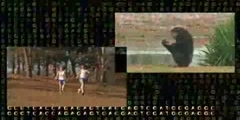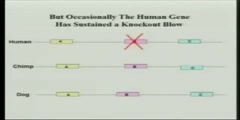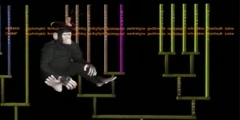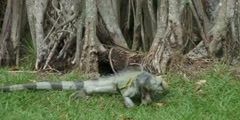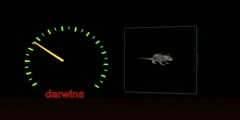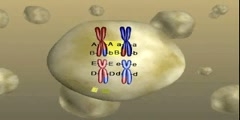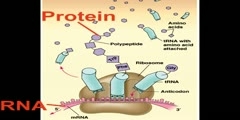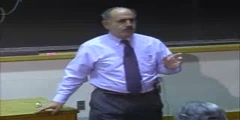Lec 4 - Neutral Evolution: Genetic Drift
"Lec 4 - Neutral Evolution: Genetic Drift" Principles of Evolution, Ecology and Behavior (EEB 122) Neutral evolution occurs when genes do not experience natural selection because they have no effect on reproductive success. Neutrality arises when mutations in an organism's genotype cause no change in its phenotype, or when changes in the genotype bring about changes in the phenotype that do not affect reproductive success. Because neutral genes do not change in any particular direction over time and simply "drift," thanks in part to the randomness of meiosis, they can be used as a sort of molecular clock to determine common ancestors or places in the phylogenetic tree of life. 00:00 - Chapter 1. Introduction 04:56 - Chapter 2. Genes and Amino Acid Changes Not Reflected in Phenotypes 14:29 - Chapter 3. Neutral Evolution in the History of Life 20:38 - Chapter 4. Mechanisms of Neutral or Random Evolution 35:28 - Chapter 5. The Molecular Clock of Neutral Evolution Complete course materials are available at the Open Yale Courses website: http://open.yale.edu/courses This course was recorded in Spring 2009.
Video is embedded from external source so embedding is not available.
Video is embedded from external source so download is not available.
Channels: Ecology
Tags: meiotic drivers neutral evolution maladaptation amino acids phenotype genotype mutation allele fixation pseudogenes junk DNA common ancestry canalization trait accumulation
Uploaded by: yaleevoeco ( Send Message ) on 02-09-2012.
Duration: 44m 3s
Here is the next lecture for this course
How Evolution REALLY Works, Part I
00:00 | 12963 viewsLec 7 - The Importance of Development in ...
45:51 | 3051 viewsImaginary mechanisms of evolution: Mutation
06:16 | 8170 viewsFacts Of Evolution : Retroviruses And Ps ...
08:12 | 6766 viewsEvidence for Evolution Pseudogenes and t ...
03:30 | 5901 viewsUbiquitous Proteins and Evolution in Gene ...
02:54 | 6422 viewsWhat Can Embryos Tell Us About Evolution?
03:44 | 23076 viewsHow Fast Is Evolution?
02:44 | 8408 viewsEvolution
12:34 | 9637 viewsMechanism Behind Genetic Diversity
01:38 | 10556 viewsLec 1 - The Nature of Evolution: Selectio ...
43:06 | 5096 viewsHow Evolution Works Part 3- DNA
09:51 | 6415 viewsLec 6 - The Origin and Maintenance of Gen ...
48:15 | 3342 viewsEvolution Genetic Evidence Transposons
03:20 | 9117 viewsVirology/Tumor Viruses Lecture MIT
50:21 | 17360 viewsNo content is added to this lecture.
This video is a part of a lecture series from of Yale
Lecture list for this course
Lec 1 - The Nature of Evolution: Selection, Inheritance, and History
Lec 2 - Basic Transmission Genetics
Lec 3 - Adaptive Evolution: Natural Selection
Lec 5 - How Selection Changes the Genetic Composition of Population
Lec 6 - The Origin and Maintenance of Genetic Variation
Lec 7 - The Importance of Development in Evolution
Lec 8 - The Expression of Variation: Reaction Norms
Lec 11 - Life History Evolution
Lec 14 - Species and Speciation
Lec 15 - Phylogeny and Systematics
Lec 16 - Comparative Methods: Trees, Maps, and Traits
Lec 17 - Key Events in Evolution
Lec 18 - Major Events in the Geological Theatre
Lec 19 - The Fossil Record and Life's History
Lec 21 - Evolutionary Medicine
Lec 22 - The Impact of Evolutionary Thought on the Social Sciences
Lec 24 - Climate and the Distribution of Life on Earth
Lec 25 - Interactions with the Physical Environment
Lec 26 - Population Growth: Density Effects
Lec 27 - Interspecific Competition
Lec 28 - Ecological Communities
Lec 29 - Island Biogeography and Invasive Species
Lec 30 - Energy and Matter in Ecosystems
Lec 31 - Why So Many Species? The Factors Affecting Biodiversity
Lec 32 - Economic Decisions for the Foraging Individual
Lec 33 - Evolutionary Game Theory: Fighting and Contests
Lec 34 - Mating Systems and Parental Care




